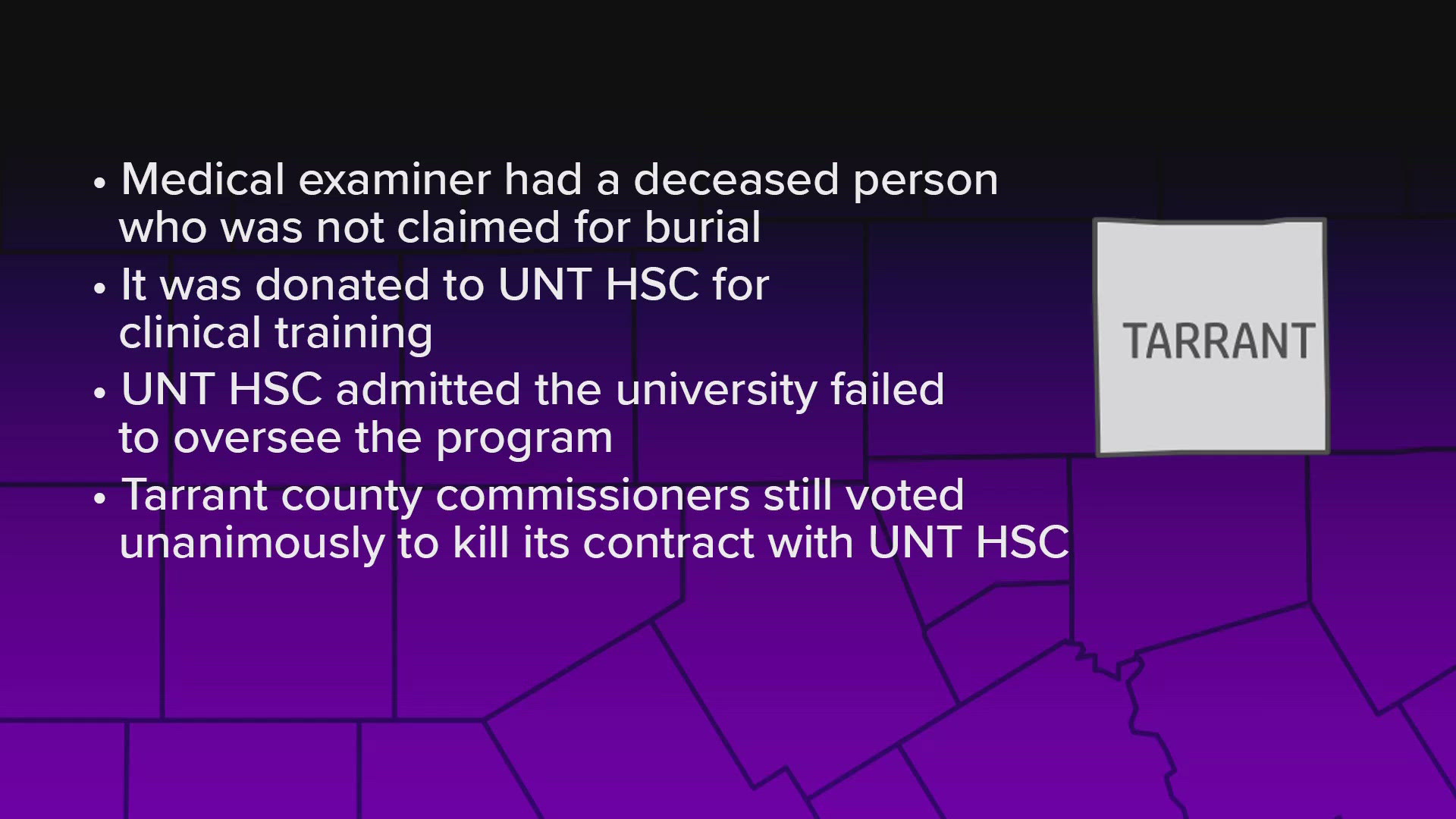FORT WORTH, Texas — Both Tarrant and Dallas counties have ended their contracts with the University of North Texas Health Science Center that allowed for the counties to donate “indigent and unclaimed” bodies to the center for medical research.
The Tarrant County Commissioners on Tuesday voted to direct the county administrator to close out its partnership on a program with the University of North Texas Health Science Center that allowed for the county to donate “indigent and unclaimed” bodies to the center for medical research.
The move comes after the University of North Texas Health Science Center suspended a program that used unclaimed bodies for medical research and sold some of the bodies to companies across the country, according to an NBC News investigation. The NBC investigation detailed how UNTHSC used more than 2,000 unclaimed bodies given to it since 2019 under agreements with Tarrant and Dallas Counties.
Of those, the center selected more than 830 bodies for dissection and study, according to NBC. The investigation found others were sold, sometimes limb by limb, to medical companies and the U.S. Army. The investigation identified at least 12 people whose bodies were given to the school unbeknownst to families. Ten companies told NBC that they didn’t know the center had provided them with unclaimed bodies.
In response to the investigation, UNTHSC said it was suspending the Willed Body Program pending an “internal assessment and review by an external global consulting firm with expertise in health care,” fired program leadership and closed its BioSkills Lab.
It’s unclear how many people were fired.
“We have become aware of issues within our Willed Body Program, and that failures existed in its management and oversight,” UNTHSC said in a statement on its website. “The program has fallen short of the standards of respect, care and professionalism that we demand. The University of North Texas Health Science Center at Fort Worth extends its deepest apologies to the families who have been impacted.”
“The intent of the program is to educate future physicians, scientists and other health professionals and improve the quality of health for families and future generations,” UNTHSC’s statement continued. “We are committed to operating all programs with transparency, integrity and the highest ethical standards, and we are dedicated to maintaining trust in our institution. We hope these actions ensure our educational studies are made with every effort to show dignity, grace and respect.”
Tarrant County’s previous agreement with UNTHSC said a dead body “that is not claimed for burial or requires disposition at County expense” could be donated to UNTHSC for “clinical training, research and medical education programs.” Per the agreement, after the body was used by UNTHSC, it would be cremated with the ashes returned to the decedent’s family. Bodies not used for medical research could be cremated by UNTHSC at a cost to the county of $300 per cremation, according to the agreement.
“I believe each member of the court was unanimous in what was their desire to terminate this contract. UNT has already terminated it. We’re directing the county administrator to wrap up the program with UNTHSC as fast as humanly possible,” Tarrant County Judge Tim O’Hare said. “I believe…each member of the court agrees…that no one’s body should be used for medical research absent their pre-death consent or the consent of a loved one and certainly no one’s body should be sold for profit absent consent one way or the other.”
Serena Karim, a nursing student at UTA, and a co-author on the research letter that sparked the investigation, spoke Tuesday against the agreement with UNTHSC.
“Like many of us, I was shocked to discover that one’s body could be dissected, separated and sold without consent from the deceased or their next of kin,” Karim said. “As future healthcare professionals, we are taught to advocate for our patients, to speak up when we feel their rights are violated, and to consider the ethical implications of our practice beyond the hospital. I’m glad to see that these real heartbreaking stories are finally getting the public attention they deserve, and I urge us to terminate this agreement to prevent these violations from happening again.”
"I think it’s important to highlight that what was immoral about the Willed Body Program at UNT HSC was not merely its failure to locate surviving relatives, or the fact that it used the unclaimed to generate revenue," said UTA medical ethicist and professor Dr. Eli Shupe. "Accepting unclaimed bodies at all was unacceptable. Even people with no surviving next of kin do not deserve to be dissected after death without their consent."
Commissioners in Dallas County recently voted to postpone a vote on whether or not to extend their contract with UNTHSC.
In a statement, Wednesday, though, Dallas County Judge Clay Lewis Jenkins said Dallas County had suspended its contract with the center, too.
"Dallas County contracted with the University of North Texas Health Science Center (UNTHSC) to provide decedent transport and manage the coordination of unclaimed bodies for medical research. That contract has been suspended and will not be renewed," Lewis Jenkins said. "Effective immediately, Dallas County will only provide unclaimed remains for medical research if the decedent has provided consent in writing before death or the family provides consent in writing after death. The County will be procuring cremation services for all unclaimed bodies from a private provider and will be developing a County operated transport service.”

